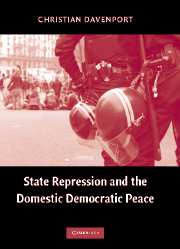Book contents
- Frontmatter
- Contents
- Figures
- Tables
- Preface
- State Repression and the Domestic Democratic Peace
- INTRODUCTION
- 1 REPRESSION AND THE SEARCH FOR PEACE
- 2 DISAGGREGATION AND CONTEXTUALIZATION
- 3 DATA AND METHODOLOGY
- 4 DEMOCRATIC PACIFICATION: THE DIRECT EFFECTS OF VOICE AND VETO
- 5 PEACE UNDER FIRE: THE INTERACTIVE EFFECT OF DEMOCRACY AND CONFLICT
- 6 (RE)CONSIDERING DOMESTIC PEACE
- Appendix I
- Appendix II
- Bibliography
- Index
- Titles in the series
Preface
Published online by Cambridge University Press: 24 July 2009
- Frontmatter
- Contents
- Figures
- Tables
- Preface
- State Repression and the Domestic Democratic Peace
- INTRODUCTION
- 1 REPRESSION AND THE SEARCH FOR PEACE
- 2 DISAGGREGATION AND CONTEXTUALIZATION
- 3 DATA AND METHODOLOGY
- 4 DEMOCRATIC PACIFICATION: THE DIRECT EFFECTS OF VOICE AND VETO
- 5 PEACE UNDER FIRE: THE INTERACTIVE EFFECT OF DEMOCRACY AND CONFLICT
- 6 (RE)CONSIDERING DOMESTIC PEACE
- Appendix I
- Appendix II
- Bibliography
- Index
- Titles in the series
Summary
For about thirteen years, I have been trying to understand why governments use political repression. By this, I am referring to very specific types of government activity: restricting civil liberties (for example, political bans and instances of censorship) and violating personal integrity rights (for example, torture, disappearances, and mass killings). Along this quest, I was initially influenced by literature on authoritarianism, but later I became interested in the connection between democracy and state-sponsored coercive behavior. The reason for my transition was clear. Increasingly over the past few decades, the world has become enamored with democratic political institutions. Within academic literature, social movements, human rights organizations, think tanks, governments, and even pop culture, it is clear that democracy is heralded as a solution to many problems confronting human beings, including state repression. Given the varied quality of this discussion and the importance of the subject matter, I decided to explore the topic more rigorously.
Although my initial investigations into the subject were somewhat more narrowly defined (focusing on the influence of national elections, constitutions, and diverse cumulative indices), as my awareness of existing scholarship increased, several weaknesses were revealed. In this context, the scope of the work enlarged. My interest was further piqued, once I realized that some of the most influential thinkers in the social sciences had similarly grappled with the subject (e.g., Hobbes, Madison, Montesquieu, and Dahl).
- Type
- Chapter
- Information
- State Repression and the Domestic Democratic Peace , pp. xiii - xivPublisher: Cambridge University PressPrint publication year: 2007

